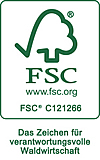
Wouldn’t it be paradoxical to manufacture one of the most sustainable advertising means with a stable value yet lose sight of nature at the end of the process? This is why we don’t just have one green thumb: we’re green-fingered, too. This allows us to manufacture products in our factory that meet our high demands in relation to ecological and economic responsibility.
Paper carrier bags are not cats who potentially have nine lives. After all, the raw material needed for a paper bag has just one life: We can’t simply use any paper type to make recycled paper and turn your ambitious ideas into reality. But what can we do if we want to use raw materials responsibly? The best option is to use paper from sustainably managed forests. Following the Rio Summit on the Environment, the global non-profit organisation FSC® was founded in 1993. Its aim is to ensure our forests are managed in an environmentally friendly, socially beneficial and economically viable manner.
The FSC Print & Paper Industry Committee certifies corresponding manufacturers and printing companies in Germany. These companies can only attribute the label to their products if the products themselves are certified. RIEDLE® works with these partners and is both FSC certified. As a result, RIEDLE® is permitted to use the logo for promotional purposes when using correspondingly certified materials.
Certification offers complete certainty that trade is carried out in accordance with the principles of the FSC, and guarantees the origins of the raw materials. It goes without saying that RIEDLE® is an FSC certificate (FSC-C121266) holder but that’s not enough in our eyes: We want more and have had the company itself and our high-quality paper bags certified as being climate-neutral. And we’ll gladly swim against the current, too: 100% of the electricity used by our company is hydroelectricity. And there’s even more! You’re currently looking at a CO2-neutral website, too. After all, you ought to be able to browse our website with a clear conscience. Even if you stay a while.
The new packaging law came into effect on 01/01/2019 and replaced packaging regulations that have been in force since 1991. This packaging law should result in greater transparency and fairness on the packaging-disposal market. According to the law, anyone who introduces packaging into the German market must also make a contribution by paying a disposal fee (licensing) for the subsequent disposal or recycling.
The packaging law distinguishes between transport packaging, outer packaging and sales packaging, as well as reusable and single-use packaging with a deposit in certain cases. Regardless of whether the packaging or packaging components reach the end consumer, the filled sales packaging becomes “subject to system participation”.
Even if the carrier bag is often only filled when issued, they are consequently deemed “service packaging” and the issuing companies therefore fall under the scope of the law and compulsory registration. However, with the exception that for this kind of packaging, the distributor may delegate these obligations to this supplier. RIEDLE® is already registered in the publicly accessible LUCID manufacturer register – the packaging register for the “Central Packaging Register Office”, www.verpackungsregister.org – with the registration number DE4850969731945.
We make it easy. With our worry-free package, we can supply you with pre-licensed paper carrier bags. You don’t need to do anything further. We legally undertake the entire process in accordance with the packaging law. Your order invoice is sufficient proof for the authorities.
Congratulations! You’re doing everything right. You’ve visited our website because you’ve already made an important decision: to avoid plastic.
From an environmental point of view, paper carrier bags are generally better than those made of plastic since the overall balance including recyclability and compostability is better come the end of the product’s life cycle. As a rule, tear-resistant paper bags are heavier than plastic bags since they need thicker walls to provide identical tear resistance. This increases the amount of material required per bag and results in higher transport emissions. However, using them multiple times and simple recycling at the end of their useful life significantly improves the environmental balance of paper bags.
The huge selection of paper thicknesses adapted to the intended use, as well as carry-handle and cord solutions, not to mention using the offset printing process, makes it possible to specifically choose individually environmentally friendly components. It must therefore be the aim to hand out high-quality paper carrier bags that guarantee they will be used multiple times thanks to their characteristics, thereby helping to cut plastic waste.
All good things come in threes – from the third use onwards, a paper carrier bag without special environmentally friendly production beats the eco-balance of a crude-oil-based plastic bag. Ta-dah! This value can easily be increased through other measures – using FSC-certified kraft paper and verifiable climate-neutral printing, for example. RIEDLE® can do it! And more besides: Tear-resistant stabilisers are unproblematic processes that can also be checked by the user by looking at the imprint on the corresponding labels. Individual measures and projects can be traced based on the details included with the corresponding tracking number. Before we forget: A little known fact – and therefore something that needs highlighting – is that reusable paper carrier bags are still largely made by hand. Working conditions and commercial relationships are therefore a key element when considering sustainability and fair dealings – not only with nature – but with people, too.
Everyone thinks recycling is great until you take a look behind the waster paper container brimming with positive associations. After all, the recycling process generates papers with relatively short fibres. This results in a load-bearing capacity that is only conditionally suitable as a reusable solution. Adding new fibres to increase the paper strength once again has an effect on eco-friendliness. If you need to manufacture white paper – also known as graphic paper – for writing, copying or printing, the printing inks on recycled paper must be chemically and mechanically bleached out using caustic soda and soap (de-inking). This is particularly problematic for printing inks that cannot be removed in the usual manner, such as those inks used in flexo printing or digital printing. The predominantly brown paper selection, as well as the print and finish variants, give this bag a very strong “eco-image”. To implement the corporate identity of companies, paper bags made from recycling paper therefore offer limited possibilities currently. And if the paper or paper carrier bag is imported from the Far East, the week-long journey has a further negative impact on the eco-balance. This is why we suggest you ask whether eco truly is eco. Or if it only seems so…
So that a reusable bag is better for the environment than a single-use plastic bag, it must be reused a minimum number of times. Due to their processing and material strength compared with single-use plastic bags, reusable bags need more material, resources and energy to manufacture. Due to the way in which they are cultivated, classic materials for reusable bags – such as cotton, raffia or flax – have a huge environmental impact due to water and energy consumption, eutrophication and acidification. To counteract this ecological burden, cotton bags need to be used up to 80 times to have less of an impact than polyethylene bags made from new granulate. Let’s be honest: How often have you managed to do this with a fabric bag? And there are no suitable printing processes available to ensure brilliant, high-resolution advertising. So is everything just a sham?
Alongside natural fabrics, reusable bags (woven or non-woven) are increasingly made from plastics such as polypropylene, polyester and polyethylenterephthalat (PET). And we hear and marvel that reusable plastic bags offer clear advantages over natural fibres in the provision of raw materials and production. They need to be reused fewer times to make them more environmentally friendly than single-use plastic bags. A reusable bag made from polypropylene is therefore more environmentally friendly after three uses than a single-use polyethylene bag. Furthermore, the majority of reusable bags are predominantly (up to 90%) made from recycled material, such as old PET drinks bottles. The printing of logos and image motifs is only possible to a limited extent depending on the finish. However, as with every other bag, reusable plastic bags eventually meet their maker. And it takes at least 450 years to meet their maker... At second glance, plastic is still plastic, and can then be found as microplastic in the environment at the end of its product lifecycle. In this timeframe, our paper bags simply become nature all over again…

